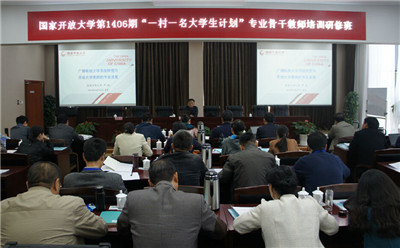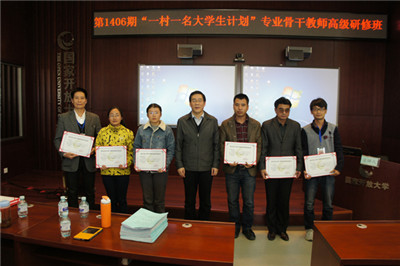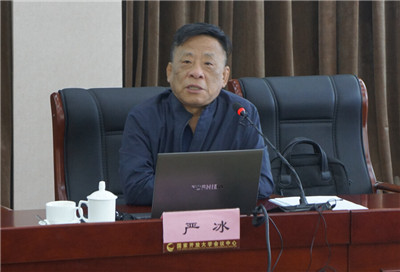 From October 27 to November 6, 2014, the OUC’s No. 1406 Senior Workshop for Backbone Teachers was held in Beijing. The workshop lasted for two weeks and marked the first time that the “One College Student Per Village” plan carried out training for professional backbone teachers in the system of the Open University of China (OUC). A total of 48 teachers from 27 provincial schools and teaching locations within the “One College Student Per Village” plan took part in the course and completed their study.
From October 27 to November 6, 2014, the OUC’s No. 1406 Senior Workshop for Backbone Teachers was held in Beijing. The workshop lasted for two weeks and marked the first time that the “One College Student Per Village” plan carried out training for professional backbone teachers in the system of the Open University of China (OUC). A total of 48 teachers from 27 provincial schools and teaching locations within the “One College Student Per Village” plan took part in the course and completed their study.
Vice President of the OUC Li Ling presented certificates of completion to all students.


Vice President of the OUC Yan Bing gave a report entitled “The Transition of the RTVU System and the Professional Development of Teachers in Open Universities” at the opening ceremony. Yan Bing pointed out that the trial of “One College Student Per Village” plan was an important move for the OUC to serve social development, particularly with regards to serving rural reform and development.

Yan Bing emphasized that this year was the tenth year of the trial and that it was time to summarize the experiences so far and create an updated version. Firstly, it is necessary to establish school orientation and positioning, and persevere in the work relating to agriculture and the countryside so as to serve modern agriculture and cultivate a new type of well-educated villagers. Secondly, they should strength school capacity construction so as to further meet the needs of society in the countryside. Thirdly, it is necessary to further explore the creation of a training model, including who should be trained, how they should be trained and how the quality of the villagers can be measured. Lastly, the professional training system and teaching operating mechanism should be improved and cooperation with colleges and universities, agricultural companies and units at different levels in the OUC system should be strengthened.
Yan Bing also set forth four core objectives for the strategic transition of the RTVU system. Firstly, the basic construction of open universities as a new type of university operation system should have a decisive progress. Secondly, open universities should be brought into the centre of the present schooling system and obtain a reliable policy guarantee. Thirdly, the qualities, features and roles of the OUC as a new type of university operation system should be widely accepted and have international influence. Lastly, the OUC school system should correspond with the progress of Chinese social development and education reform.
The training content was divided into two parts. The first part included lectures and discussion about open and distance education and education digitization. The themes included current hot topics such as ubiquitous education under the mobile Internet environment, the construction of digital learning resources, the production of online courses, the design and development of micro-lectures, and the definition and responsibilities of tutors in open universities. Special lectures including course system construction for vocational education, the application of PowerPoint in courseware design, constructivism and the five-star instruction model, were also available. The other part of the training content revolved around issues such as China’s cultivated land reserves and the revelation of a balanced policy of occupation and compensation in the progress of current Chinese new socialist countryside construction; overall urban-rural development and urbanization; the route to a rural inclusive financial system; the developmental situation of the national vegetable seed industry; and training a new type of villager. Well-known scholars and specialists from a number of famous universities including Peking University, China Agricultural University, Beijing Normal University, Beijing Agricultural College and Beijing Vocational College of Agriculture, and from the Online Instruction of New Oriental and UFIDA University, were invited to give lectures on special topics.
By Li Ruifu, the OUC